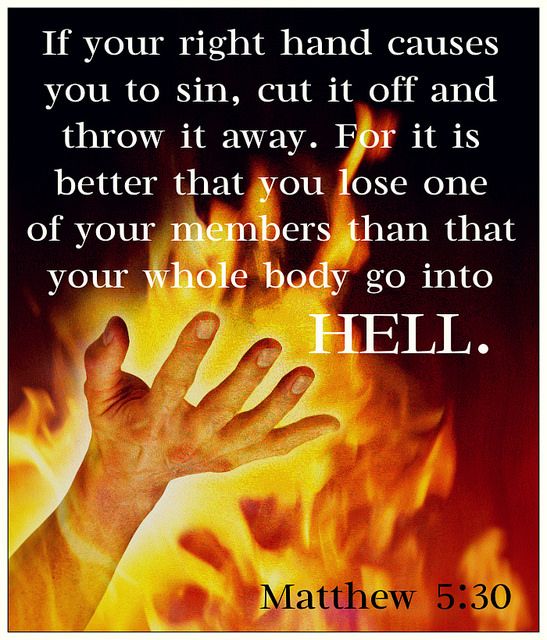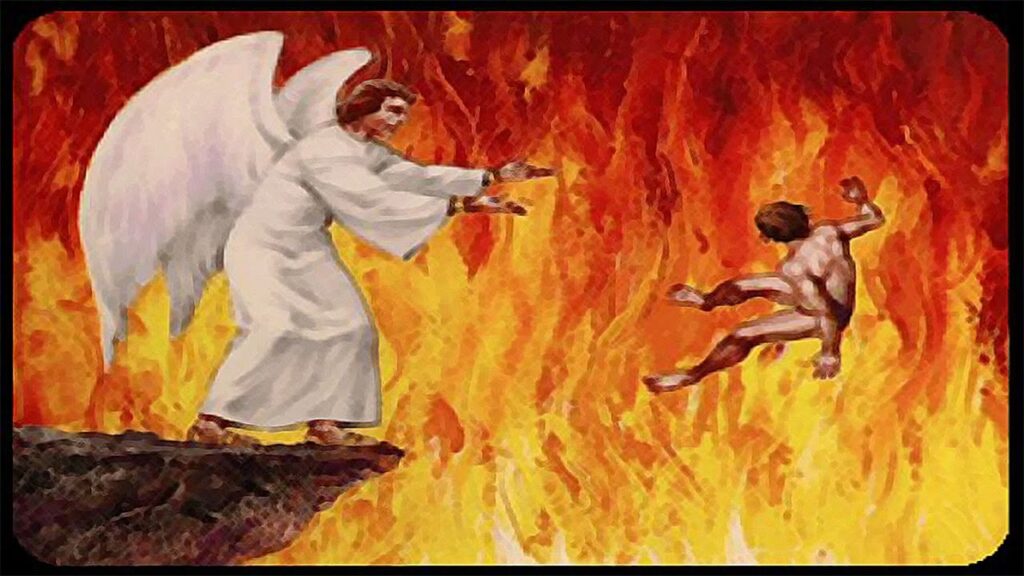Dismemberment and Mutilation in the First Century
Introduction
This is one of the last posts in the gehenna series, which attempts to understand Jesus’s Gehenna statements found in the Gospels. If you have not yet read the previous posts, some of the material in this post may appear confusing because I use the information in those previous blog entries and build upon them here, developing a theme to follow. Much like mathematics, one needs to first understand the basic concepts before moving on to the more advanced problems; this post utilizes information provided in those entries and adds to them information that helps to paint a picture of Jesus’s words about Gehenna. If you have not yet read through those posts, the first in the series one can be found HERE.
Whenever an individual searches the Bible to find the passages about “hell,” they will frequently arrive at the Sermon on the Mount, primarily because of the frequency that Gehenna is employed in that discourse. Among Mark and Matthew, Gehenna is found six times in the Sermon on the Mount (SM) alone, which leaves only six other references out of the twelve total citations of the English word “hell” in all of the Bible. One of the most well-known “hell” passages in the entire Bible is in the SM, in Matthew 5:27-30. That is where Jesus makes the audacious claim that it is better to cut off a limb or gouge out an eye than to be cast into Gehenna. The overwhelming majority of Christians who read this passage believe it suggests that it is better to cut off what currently causes one to sin than to keep sinning and be cast into hell. However, further investigation into first-century cultural norms may suggest something different than what countless believers imagine this section implies.
Matthew 5:27-30
The relevant passage is this:
27 “You have heard that it was said, ‘You shall not commit adultery.’ 28 But I tell you that anyone who looks at a woman lustfully has already committed adultery with her in his heart. 29 If your right eye causes you to stumble, gouge it out and throw it away. It is better for you to lose one part of your body than for your whole body to be thrown into hell. 30 And if your right hand causes you to stumble, cut it off and throw it away. It is better for you to lose one part of your body than for your whole body to go into hell.

The context of this passage is confirmed in the first sentence, which is adultery. Therefore, whatever we read from this text ought to be through the lens of sexual sin with someone other than one’s spouse. However, there is more taking place in this passage contextually than a straightforward condemnation of sleeping with someone who is not your spouse. While I will not delve into the specifics of adultery or sexual sin in this blog post, my focus will be on the two statements concerning the removal of a specific body part: the right eye and the right hand.
Honor and Shame in Matthew
As I expressed in a previous blog post on Honor and Shame (found HERE), Matthew’s Gospel is inundated with language that speaks directly to an honor and shame (HS) society. Since most contemporary western civilizations are more individualistic and not a collectivist like first-century Israel, the HS terminology may not be fully understood, let alone even recognized. Notice Matthew’s designation of the “right” eye or the “right” hand. If the point of the story is just to cut off what causes someone to sin, why mention the specific modifier of “right?”
In a first-century HS society, the right-side body parts were considered the most honorable. For example, the right hand is regarded as the sword-wielding hand and the same hand you would swear an oath with. Both actions bring honor to the individual. By contrast, the left hand was considered shameful because it was often deemed the “toilet hand.” A verse that illustrates this difference between the right and left hand is Jesus’s statement in Matt. 5:39, which says, “If anyone slaps you on the right cheek, turn to them the other cheek also.” That statement would leave a profound impression in a first-century HS Jewish society because of what it implies, if even undetected by modern readers. Ordinarily, many contemporary pastors interpret that statement as a backhanded slap from someone else’s right hand, which is specifically designed to insult someone. Though that certainly could be the explanation, it could also be viewed as shameful if someone slaps your “right” cheek (honorable side) with their “left” hand (dishonorable) since that is the hand used for toilet duties and using your toilet hand to strike someone on the honorable part of their face may be more appalling than a backhanded slap.
Mutilation of the Body
Nevertheless, the emphasis on “right” by Jesus concerning the eye and hand causing one to sin designates the removal of an honorable body part by a hypothetical process of self-mutilation. Though Jesus does not “literally” desire someone to mutilate their body by cutting off their hand, the use of hyperbole here would undoubtedly impact his disciples (who are the recipients of the SM) due to the graphic content of his claims. The hyperbolic statement, “If your right hand causes you to sin, cut it off and throw it away” denotes the drastic and severe action of cutting off an honorable body part to eliminate sin. However, there is even more to this extreme statement by Jesus than simply hyperbole.

For example, the mutilation of an individual’s body renders the individual shameful or dishonorable, regardless of the part of the body missing. Furthermore, those with mutilated or defective bodies due to missing body parts or limbs are likewise considered unclean and, therefore, cannot perform certain religious functions, such as entering the temple to offer sacrifices, which would be a significant concern to a first-century Jew. Moreover, the act of self-mutilation would be virtually unheard of at that time because it would indicate someone is willingly shaming themselves (in a highly HS society) and bringing dishonor to their name by cutting off something as crucial as their right hand. Therefore, Jesus informing his disciples to cut off their honorable right hand implies much more than simply getting rid of sin. It indicates an act of self-shaming, not seeking honor for yourself, taking the status of someone such as a slave or child, and willingly becoming unclean and unable to enter the temple. To be sure, this warning is extreme, and its impression is not lost on the disciples.
Status in Society
That statement about cutting off a body part from Jesus likewise suggests to the disciples not to participate in the “honor and shame game” (more about that in the post HERE). Instead, what Jesus wants the disciples to do, is to take the lower status in society willingly and not attempt to bring honor to themselves, which is something the Pharisees did rather frequently. Jesus wants his disciples to be superior to the Pharisees, but not in terms of “honor,” which is why many of these instructions to the disciples are contrasted later in Matthew by the wicked deeds of the Pharisees. There are several occasions in scripture where Jesus makes that claim about the disciples. Still, one of the more prominent examples is the doublet of Matt 5:27-30 in Matt 18:1-9 where Jesus is also speaking to the disciples about cultural status in individuals. Here, he instructs the disciples to be like “little children.” That does not mean, as many Christians think, that we should have faith as a child (not asking questions), but that the disciples (and therefore us) should not seek out our own glory but to willingly take the status of a child, which was near the bottom of society in first century Judaism. Matthew 18:2b states, “Truly I tell you, unless you change and become like children, you will never enter the kingdom of heaven.” In sum, Matthew 18:1-9 is a passage about humility, taking the form of a lowly servant, and placing others above yourself. Therefore, when Jesus instructs the disciples to cut off their right hand, he insinuates that social status should not be the concern—removing sin should be instead, which is an apparent reversal of what society believed at that time.
Mutilation and Dismemberment in Greek Literature
Intriguingly, secular Greek literature oftentimes mentions voluntary self-mutilation as a “lesser of two evils,” with the most understandable reason for cutting off a body part being for medical reasons. For example, the second-century philosopher Celsus once wrote, “There is one sad and solitary remedy to secure the safety of the rest of the body, that is to cut away the limb which is gradually dying.” Similarly, the first-century philosopher Philo, a contemporary of Jesus, similarly asserted that a “wise person” would much rather lose an eye or tongue than see or say something they should not do.
Still, it was a contemporary of Jesus’s time in the first century who has the most pertinent parallel. The renowned philosopher Seneca describes the act of self-mutilation in specific terms of self-control when he writes, “Cast away any part of the body that would cause you not to live abstinently. For it is better to live abstinently without this part that ruinously with it.” Notice how Seneca says to cast away any part that would cause you to not live abstinently (resisting sexual sin)? That statement from Seneca is likewise about sexuality, much like how Jesus’s statement is about the similar theme of sexual immorality and, more specifically, adultery. It appears this was a standard message among philosophers and sages in the first century to suggest, though not in a literal manner, that self-mutilation exceeds the prospect of sinning sexually, especially with someone else’s spouse. Even in contemporary Greek literature, self-mutilation is perceived as grim but ultimately worthwhile.
Dismemberment and Gehenna
In a similar fashion to Seneca, Jesus employs the theme of self-mutilation as a superior act to something much, much worse. Seneca says it is better to cut that part off than to live “ruinously with it.” According to dictionary.com, ruinously means “bringing or tending to bring ruin; destructive; disastrous.” In a thoroughly Jewish manner, Jesus contrasts the act of cutting off an honorable body part that causes one to sin with something far worse and far more shameful. And what, precisely, is Jesus contrasting the self-mutilation of an honorable body part with? Having your entire body cast into Gehenna or the Hinnom Valley (more about the Hinnom Valley background HERE). Sacrificing an honorable body part now, such as the right hand, is far worse than sacrificing the whole body later in that shameful valley, where the body would be cremated and severely dishonored, ultimately denying the individual participation in the resurrection since there are no physical remains to resurrect. This is the fundamental part of the message that Jesus proclaims, which countless modern readers are generally unable to recognize or put together because of the vast difference in cultural understanding about honor and shame scenarios.
The Point of Self-Mutilation
Why would Jesus use self-mutilation of such an honorable body part in such an extreme statement? In the first century, mutilation was performed for various reasons, but regardless of precisely why it was performed, one example of why mutilation occurred is that the removal of an honorable body part could also be considered as a power dynamic between the aggressor and the victim. An excellent illustration of this aggressor/victim dynamic is the story in 1 Samuel 10:27-11:11, which is highly relatable to Jesus’s words in the SM. In 1 Samuel, Nahash the Ammonite is causing trouble. First, the text states that Nahash was abusing the tribes of Gad and Reuben by gouging out the right eye of every Israelite within those groups. Later in the story, seven thousand Israelites escape to Jabesh-Gilead, but Nahash besieges the city a month later to sign a vassal treaty with them and declares, “I will make a treaty with you only on the condition that I gouge out the right eye of every one of you and so bring disgrace on all Israel” (1 Sam. 11:2). The text directly states that the result of gouging out an eye is for shame and disgrace, not for punishment, pain, or torture. Therefore, when Jesus says to his disciples, “if your eye causes you to sin, gouge it out,” he is referencing an OT narrative and a Jewish-specific cultural tradition of shame that the disciples most assuredly knew and would take into account when Jesus issued such a strong warning about removing their right eye.
The mutilating of the body stands as an unambiguous warning to the disciples because mutilation of a body part as a form of punishment is virtually absent within Judaism. In the OT law, which Jesus refers to frequently, there is only one place where mutilation or dismemberment is mentioned as a form of punishment (Deut. 25:11-12), which is perhaps the most perplexing law of the entire Hebrew Bible (a woman having her hand cut off if she grabs the genitals of her husband’s attacker). Though expositors have endlessly debated this passage and what its original intent was, the fact that it is the only place in scripture where dismemberment is used as a form of punishment should be noted. Many other societies in that time (and even some today) use mutilation as a threat and a form of punishment for an individual who breaks the law in a significant fashion. However, the Bible never utilizes dismemberment for punishment (less the one example above) because of how serious it is to be missing a limb and, therefore, to be considered incomplete, unclean, or shamed.
Emphasis on the Physicalness of Jesus’s Statement
In Matthew 5:27-30, Jesus emphasizes a strictly physical method of self-control. There is nothing “spiritual” about his warning in this passage, and he does not ask his disciples to “pray away the sin,” so to speak. It is not a spiritual urging but a call to something drastic using the physical body as an example. The word Matthew uses for “body” is the Greek word soma. In scripture, soma always refers to material things such as a human body or corpse, plant or seed structure, any form of substantive reality, or the thing itself. Essentially, every description of soma in scripture refers particularly to a physical body and does not refer to any form of a spiritual connotation, such as a soul. Therefore, Matthew represents Jesus’s words in the SM as essentially saying, “It is better to cut off that honorable body part and be considered shameful now while you are alive, than for your whole physical body (living or dead) to be cast into that desecrated place (a shameful end) called the Valley of Hinnom, and have your name be humiliated and disgraced for all time” (Dan. 12:2). Scholar Jerome Neyrey claims that a man’s body is a “stage where honor is displayed.” As a result, this reference to the entire body thrown into the most shameful place in Israel becomes a highly cautionary tale considering its sociological context.

The warning from Jesus to the disciples is meant to encourage them to practice humility and humbleness now rather than attempt to gain honor for themselves (such as the Pharisees did) and thereby risk being ultimately humiliated and disgraced later, which, coincidentally, Jesus did to the Pharisees. The disciples ought to look at the long-term effects rather than the immediate results that were so prevalent in their society at that time. It is a message that resonates well with contemporary readers if they can move past this passage being about “hell.” Furthermore, if the Hinnom Valley meant hell, how were the disciples at risk of being thrown into it? What does this passage have to do with faith in Christ if lack of faith is the only means to being thrown into hell? Jesus is using the honor and shame language of the time to demonstrate a point to his disciples that removing the sinful deeds in your life now, no matter how difficult it may be, could develop and become much worse later if left unrestrained. Unfortunately, attaching the word “hell” at the end of this statement here minimizes the original intent and message of this part of the sermon.
Conclusion
The voluntary dismemberment of a body part (especially such an honorable one as the right hand or eye), should be the last resort in an urgent attempt to save something more valuable, which is one’s life. In an honor and shame society, one’s name and reputation is everything, so to have those shamed, dishonored, and disgraced by having one’s corpse tossed into the Hinnom Valley to be left for birds and scavengers would be much worse because the ramifications suggest that that individual would not be eligible for the future resurrection, along with becoming forever shamed among their family and peers. Jesus employs this warning to his disciples (and anyone else hearing) to give a hyperbolic statement about how dangerous it is to give into sexual temptation, especially in the form of adultery. The strictly physical nature of Jesus’s comments in this portion of the Sermon on the Mount, along with Matthew’s inundated honor and shame language, suggest that Gehenna does not mean “hell” in the contemporary connotation of eternal torment and punishment in the afterlife for souls who are not Christians but represents something worse—something shameful, disgraceful, and dishonorable that would remain with the individual for eternity who has their body cast into that reprehensible and disgusting valley.
Previous blog post on honor and shame in burial HERE
Next blog post on how Jesus uses Gehenna HERE
Jerome Neyrey, Honor and Shame in the Gospel of Matthew
Craig Keener, The Gospel of Matthew: A Socio-Rhetorical Commentary.
Robert H. Stein, The Method and Message of Jesus’ Teachings
Gerd Theissen. Sociology of Early Palestinian Christianity


